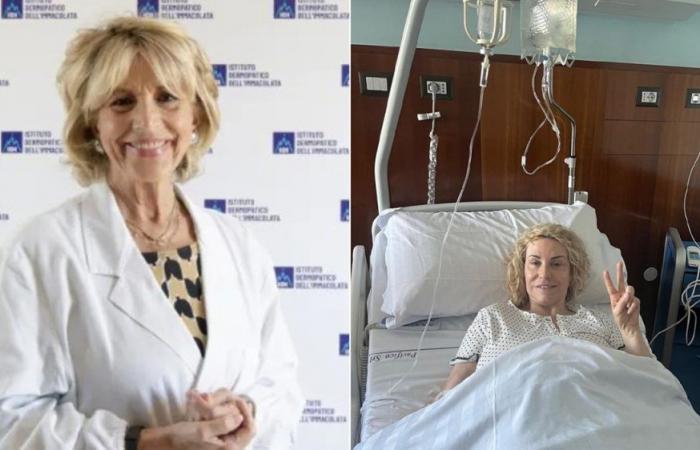Antonella Clerici said she had emergency ovarian surgery after a simple routine check-up. In a post on Instagram, the presenter published a photo from her hospital bed, in which she makes the victory sign to reassure her supporters. She expressed heartfelt thanks to all the medical staff who followed her, with a particular mention for Dr. Adriana Bonifacino, oncologist responsible for clinical breast care at the IDI-IRCCS in Rome. «Adriana Bonifacino was always at my side with sweetness, firmness, competence and affection», wrote Clerici.
The social controversies
There was no shortage of controversy, with some users raising doubts about the speed of the intervention received from Antonella Clerici. One user wrote: «With an ordinary person it wouldn’t have gone so quickly».
To these criticisms, Dr. Bonifacino responded firmly: «As far as I’m concerned, that’s not the case. I’ve been working for 45 years and I can assure you that there is a lot of good public health. I admit that there are difficulties, but I have always worked in hospitals and public environments for 44 years. Antonella talks about it and speaks to people’s hearts. But many others and certainly not for me could do it. We are here.”
Doctor Adriana Bonifacino
Dr. Bonifacino returned to the discussion that arose under Antonella Clerici’s post, regarding the inefficiency of the National Health System. Adriana Bonifacini is a breast specialist, oncologist and author of numerous scientific publications. In 2008 she was president of the “IncontraDonna” foundation, a non-profit organization that pursues the right to health and promotes cancer prevention.
Under Antonella Clerici’s Instagram post, several users responded by commenting that “with an ordinary person everything wouldn’t have gone so quickly.” It is true?
«When I hear people say “I’ve been on the waiting list for months”, it’s often because they’re talking about non-urgent operations such as a hernia or meniscus. There are regional laws according to which a patient who has certain pathologies, for example oncological, or there is even just the suspicion that he has them, cannot wait more than 30-40 days from the moment of diagnosis to the operation. With Covid, times took a little longer, but there was a pandemic. So for certain problems there are not such long waiting lists, then it is clear that if a person has insurance and decides to have surgery after two days in a private hospital he is free to do so. There are many people in Italy, VIPs and otherwise, who have health insurance, there is nothing wrong with it.”
Is our National Health System in such critical conditions as is often said?
«The first thing to say is that in Italy we have a universalistic National Health System, so much so that we are among the few to take care of immigrants in emergency conditions and treat them in public hospitals. We also welcome people from places like Albania, where chemotherapy is paid. All you need is an STP card and you receive the exact same care as an Italian citizen. So even if we have few resources we don’t say no to anyone. Regardless of the various governments that have followed one another, it is clear that there are difficulties, but it is not all black as is often described and the institutions should also do more to better inform citizens.
I’ll give a couple of examples. In Lazio, there is an electronic health record and a smart booking portal, a service that works very well. Why, despite this, do we have a rate of participation in public screening (pap tests, occult blood in the stool) that continues to fall? Of course, it is true that we can improve with regards to digitalisation and the fight against “bureaucratic toxicity”, but the fact remains that every simple citizen, on their region’s portal, can book screenings within 10-15 days. People complain, often fueled by certain TV programs, but then avoid screening and vaccines.
Another example concerns Calabria. Since Prof. Capalbo is director of the oncology department at the University of Cosenza, in 6 months he increased the number of oncology visits by 131% and brought the waiting lists from 40 days to 6. Why is this never talked about? I don’t accept it. There are many good doctors at the service of public health. We often move from the South to Rome or the North immediately after receiving the diagnosis: we try to go against the trend, even in the South there are world-class excellences.”
How important is prevention?
«There are screenings that must be carried out and which serve to intercept the most frequent pathologies such as breast cancer in women (which in 2% of cases also affects men), the Pap test and the HPV vaccination, the blood in the stool for the colon rectum. They are all free and now Europe is asking us to expand to other tests such as screening for prostate cancer (PSA test from 50 years old, 40 if there is family history), stomach cancer and lung cancer. The Regina Elena in Rome does free screening for smokers (RISP program), but people don’t take part.”
Regarding ovarian problems, are there any red flags to watch out for? What type of prevention can be done?
«The ovary is a particularly hidden organ that rarely gives symptoms. A healthy person doesn’t have to visit every 3 months, so there is plenty of time to book. Checks can also be booked from one year to the next, prevention can be planned in advance, you just need to get organised. The gynecological examination and transvaginal pelvic ultrasound are used to highlight problems involving the ovaries.
There is clearly an age when you are most at risk: women over 50 need to have regular check-ups. The risk linked to family relationships must also be publicized: there are tests that are carried out in families with cases of breast, ovarian, pancreatic, stomach and prostrate tumors, which could indicate the same mutation. These families are observed with public programs. People need to ask themselves what they had and what happened in their families. There is still a cultural gap that leads people to think “I won’t tell my son that I have had cancer”: very bad, damage is done and the possibility of understanding what type of prevention to do is taken away.”
© ALL RIGHTS RESERVED






